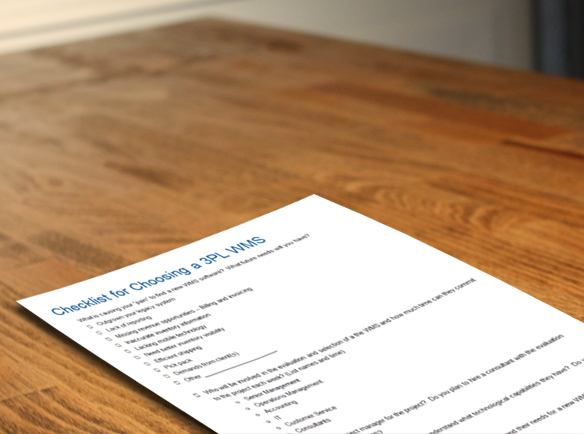Checklist for Choosing a New 3PL WMS


Are you in the process of evaluating a new warehouse management system? At a high-level, warehousing is the business of moving inventory AND data. To be successful, you have to be good at receiving, storing and shipping physical products as well as managing the information related to that inventory.
Evaluating and selecting a new warehouse management system (WMS) can be an overwhelming process. Where do you find solution providers? What information do you need? How do you compare systems? What features are important? What other non-product factors are important when selecting the right system and provider?
The checklist below is good reference to help you get started.
Checklist for Choosing a 3PL WMS
What is causing your “pain” to find a new WMS software? What future needs will you have?
- Outgrown your legacy system
- Lack of reporting
- Missing revenue opportunities – Billing and invoicing
- Inaccurate inventory information
- Lacking mobile technology
- Need better inventory visibility
- Lack of efficiency in pick, pack & ship
- Demands from client(s)
- Other ______________________
- Who will be involved in the evaluation and selection of the WMS and how much time can they commit to the project each week? (List names and time)
- Senior Management
- Operations
- Accounting
- IT
- Customer Service
- Consultants
- Do you have a project manager for the project? Do you plan to hire a consultant with the evaluation and selection of the WMS?
- Do you have IT resources in-house? Have you met with them to understand what technological capabilities they have?
- Have you met with your Operations team to understand their needs for a new WMS?
- Mobile Technology (barcode, scanning, tablets etc.)
- EDI integration? Now or later?
- Number of clients?
- Number of users? (Desktop and wireless)?
- How many warehouse locations will be on the system?
- How many orders processed per day?
- Shopping cart integration?
- Integration to carrier systems (UPS, FedEx USPS etc.)?
- Kitting or light assembly?
- Specialty reporting (i.e.Hazmat) or access to a report writer?
- Advanced pick capabilities (Pick replenishment, wave picking etc.)?
- Transportation Management System (TMS) functionality?
- Labor and expense tracking and reporting?
- KPIs / Data Analytics (operational, financial etc.)?
- Integration to client systems?
- Other ______________________________________
- Have you met with your Sales/Business Development team to find out what your clients are demanding? What types of technology will help the sales team close more clients?
- Have you mapped the business processes and where the new WMS will benefit?
- Receiving
- Inventory Management
- Shipping
- E-Commerce Fulfillment
- Freight management (TMS)
- Client billing and invoicing
- Delivering data to your clients (online portal, auto emailing, EDI, reporting, etc.)
- What is the budget for the new WMS?
- SaaS or on-premise? (Online cloud or installed on a local server)
- Hardware costs (if installed locally)?
- Upfront cost vs. Monthly costs?
- Services (training, implementation, data conversions etc.)?
- What types of data or analysis are you not getting in your current system? What KPIs do you want to see?
- What is the timeline for the new WMS?
- Internal process documentation
- Research, evaluation and selection
- Implementation & Training
- Testing
- Go live
Research vendors.
- Identify WMS vendors that are 3PL focused
- Visit vendor websites, social media, user groups to confirm vendor and product capabilities
- Contact vendors to arrange discovery call
- Schedule product demonstration and include key stakeholders
- Talk with vendor Support staff and references
- Engage with software review sites
- Address any concerns
- What vendor requirements do you have?
- Industry knowledge?
- Years in business?
- Support and training resources?
- Product development resources?
- References?
- Pricing?
- Product roadmap?
- Are they easy to do business with?
- Agree on pricing terms.
- Review purchase contract with the internal team
- Make vendor selection.
- Execute contract with the selected vendor and begin the implementation process.
-
- Industry knowledge?
- Years in business?
- Support and training resources?
- Product development resources?
- References?
- Pricing?
- Product roadmap?
- Are they easy to do business with?
- Make vendor selection.
- Agree on pricing terms.
- Review purchase contract with the internal team, sign and arrange implementation plan.
